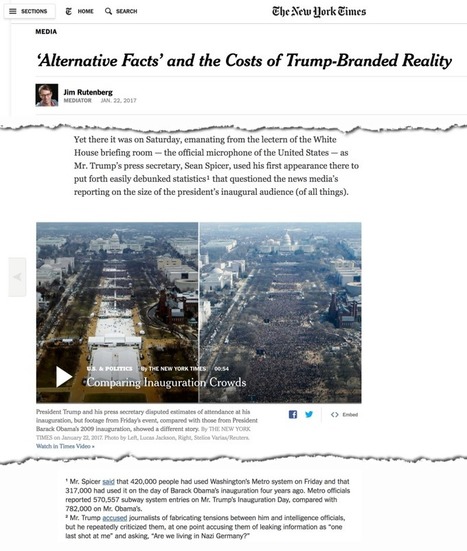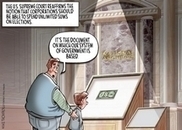 Your new post is loading...
 Your new post is loading...

|
Scooped by
Jeff Domansky
January 25, 2017 11:33 AM
|
Donald Trump is now president. This challenges many of us, not least members of the press. Countless reporters are still shaken and stunned by how he singled out a CNN reporter, one of the most respected news outlets in the world, to attack and humiliate him during his first press conference since winning the elections. Worryingly, none of his fellow journalists in the room stood up for him at the time. This wasn’t Trump’s first attack on the press, and it certainly won’t be his last. The first White House press briefing, held on Saturday, featured bullying, threats and unproven claims. That is why a new level of solidarity and cooperation is needed among the fourth estate. American journalists should stop him from dividing their ranks – however hard their professional competition may be. They should do the opposite: unite, share and collaborate. Even if doing so would mean embracing something quite unfamiliar and new to American journalism....

|
Scooped by
Jeff Domansky
December 29, 2016 12:46 AM
|
Twenty-sixteen was the year The Washington Post came of age — again. In its audience growth, in the ambitiousness of its journalism, in its impact on the American conversation, the Post became the U.S.’s fourth national newspaper company, joining The New York Times, The Wall Street Journal and USA Today. Now, come 2017, the Post seems to be doing something unique in daily journalism: It is adding journalists early in the year.“We’re adding dozens of journalists,” Fred Ryan, the Post’s publisher and CEO, told me late last week. Ryan, in arecent memo, said the Post was “profitable and growing.” “We looked at what succeeded for us in 2016 and made investments there,” he says. Ryan doesn’t want to specify the exact number of hires or how they will be apportioned. “We’re still rolling this out internally.”...

|
Scooped by
Jeff Domansky
September 6, 2013 9:38 AM
|
BuzzFeed CEO Jonah Peretti just sent a memo to his employees about the company's growth and its plans for the coming year, and it was loaded with some pretty impressive numbers. August was apparently a big month for BuzzFeed, with record traffic of 85 million unique visitors. For contrast, Twitter gets about 91 million U.S. users per month and Amazon gets 77 million U.S. users, according to Quantcast.
Based on U.S. users alone, BuzzFeed has ~41 million users, bigger than Craigslist or AOL.The company saw a record profit as well (no numbers disclosed, but Peretti says that the company went from "zero revenue four years ago to a profitable company with over 300 employees")....

|
Scooped by
Jeff Domansky
December 15, 2012 10:24 PM
|
NewsBeast Labs team creating, teaching digital journalism.
"Journalism across the board is moving away from the 'ta-da!' moment of publishing," Keller said. Social media editor Brian Ries added, "it's a result of the nerds taking over in a way. Print and magazines are very closed by nature and developers are coming in from an open sourced world where everything that you learn is shared," he said, noting that one of NewsBeast Labs' primary efforts is to help educate the newsroom.
"Sharing and educating is an obvious thing if you come from a software background," lead developer Andrew Sprouse noted. "The reason digital journalism has some of these beautiful user interfaces is because you are standing on the shoulders of programming giants before you. And everyone here in our newsroom is intelligent and capable of learning this stuff to some degree," he said....

|
Scooped by
Jeff Domansky
July 9, 2012 10:00 PM
|
We’ve seen a ton of digital ink spilled over the implications of media startup Journatic faking bylines for some of its content, including my post about the underlying economics that have forced newspapers like the Chicago Tribune to outsource their hyper-local content. While some critics choose to see outsourced journalism of the kind Journatic produces as unethical “pink slime,” the controversy over the startup’s practices actually says a lot about how difficult it is to find new ways of producing that kind of content — in part because the traditional media industry and its supporters want to force everything into old models and familiar formats....

|
Scooped by
Jeff Domansky
July 8, 2012 11:10 PM
|
Between operational fiascos and flailing attempts to slash costs on the fly, it’s clear that the print newspaper business is struggling to stay afloat. There have been cracks in publishing operations that are both hilarious and terrifying. The Times-Tribune in Scranton, Pa., published a box score for a baseball game that was never played, after one of the coaches made up a result to spare the other team the embarrassment of a forfeit. The U-T, the daily newspaper of San Diego, published a two-week-old blog post — on its front page. And most notoriously, “This American Life” revealed that Journatic, a content farm owned in part by the Tribune Company that produces local articles on the cheap, was using fake bylines. Some of those hyperlocal pieces, which ran in newspapers like The Chicago Tribune, The Chicago Sun-Times, The Houston Chronicle and The San Francisco Chronicle, were written in the Philippines.... [Great insight, perspectie on the industry's challenges by NYT's David Carr - JD]

|
Scooped by
Jeff Domansky
July 2, 2012 3:20 PM
|
How CNN got it wrong and Twitter got it right. ...Today’s decision might be a watershed moment for social media’s acceptance as a reliable news source. Traditional journalists often question social media’s validity and credibility. How can millions of individuals on Twitter be expected to get it right without producers, editors and fact checkers? Aren’t the traditional news outlets like CNN and the New York Times inherently more likely to get it right? Not necessarily. When the big decision came down, CNN got it wrong and Twitter got it right. CNN originally reported that SCOTUS struck down the individual mandate. Twitter users, on the other hand, immediately reported the mandate was upheld. So how is it that social media can be more reliable?...

|
Scooped by
Jeff Domansky
July 1, 2012 11:13 PM
|
Does the quest for balance in news stories open journalists up to claims of bias? It's all about the framing. ...How did you feel about these headlines? Does it matter to you to learn that they actually came from Fox News on the same day? (Screenshot for proof.) This faux home page was created by Dan Schultz, the MIT grad student also responsible for Truth Goggles, using his NewsJack point-and-click “remixer.” Knowing what you know now, do these headlines seem different to you? If so, you’ve just proved that we detect and judge bias based on things other than what journalists actually write. This effect has been noticed before....

|
Scooped by
Jeff Domansky
June 27, 2012 1:50 PM
|
As the media world turns.... What a weird weekend for journalism.
On Sunday, a day once reserved for fat feature-laden newspapers, a new television show and a San Francisco hackathon brought the future of the media into the limelight in very different ways.
The TV show was HBO’s “The Newsroom,” the newest project of “The Social Network” scribe (and D10 guest) Aaron Sorkin. The hackathon was NewsHack Day, an ambitious attempt to bring self-proclaimed “hacks and hackers” — journalists and coders — together for a mad weekend of learning, brainstorming and creating.
Both were entertaining. But, one was stuck in the past....
[Rally good read and exploration for news hounds - JD]

|
Scooped by
Jeff Domansky
June 23, 2012 7:35 PM
|
...And that illustrates the gravest problem facing journalism today. It's not competition from the Internet, or even the loss of local advertising monopolies. If journalism as an industry were producing consistently accurate, forward-looking, and unique reports that helped people live better lives, without ending up underwater on a crappy mortgage, competition from inferior news sources - even cheaper or free sources - wouldn't threaten the industry's survival. The gravest problem facing journalism today is its continued adherence to a stenographic model of reporting, one that accepts accurate recitation of quotes and data as truthful reporting, overlooking the very inconvenient fact that people very often lie to reporters.... [Terrific Robert Niles insight into journalism - JD]

|
Scooped by
Jeff Domansky
June 23, 2012 7:21 PM
|
This time the publisher takes to the front page, eliding the gutting of his newsroom... Not content with dominating the Times-Picayune’s front page on Thursday with a press release from its editor, the paper ran an awfully similar piece by the new publisher on page one Sunday headlined “The Times-Picayune and NOLA.com are here to stay.” As if the Times-Pic needed to remind New Orleanians that its absentee owners have brought in an outsider to gut their hometown paper, Publisher Ricky Mathews leads with it. And where he directly addresses the protests over going to a three-newspaper-a-week schedule, he doesn’t bother to mention the much more serious complaints about the paper firing half its newsroom (with nebulous and not exactly confidence-inspiring promises to add about half of the headcount back, presumably with titles like “buzz reporter”) and trying to shift readers to a website that everybody thinks is awful.... [Driving the newspaper off the road and into a canyon - JD]

|
Scooped by
Jeff Domansky
June 23, 2012 1:32 PM
|
Jonah Lehrer transgressed when he cheated his new publishers by breaking the implied (or written) contract that he was producing original copy. ...In the early hours of l’affaire Lehrer, my instincts were telling me that Lehrer had transgressed, but I couldn’t figure out whether his offense was a felony, a misdemeanor or a violation of journalistic taboo. A variety of observers were calling what Lehrer did “self-plagiarism,” but in my mind plagiarism requires some act of thievery. You can’t steal money out of your own bank account, can you? You can’t commit adultery with your own spouse, right? The words Lehrer wrote “belonged” to him even if he had surrendered the copyright to the places he published them. My feeling was that you could call Lehrer lazy for repeating himself, you could call him a hack, you could call him a sneak, but you couldn’t call him a thief. He was an onanist, playing self-abuse games with his copy, but he wasn’t any sort of plagiarist. But not long after I committed this thought to my keyboard, news reached me via the Twitter feed of the blindingly handsome @davidfolkenflik that Edward Champion was accusing Lehrer of plagiarizing Malcolm Gladwell. If it turns out that Lehrer is a plagiarist as well as an onanist, you can click here for my views on plagiarists.... [More opinion on Jonah Lehrer and the self-plagiarization issue. Surely the most important issues are honesty and transparency? See the diverse comments on this post. - JD]

|
Scooped by
Jeff Domansky
June 22, 2012 5:23 PM
|
...What we are witnessing today is the exodus of publishers that owned newspapers for high profitability and the emergence of publishers that have different ownership motives. There are many reasons to own a newspaper; a 30% profit margin is not the only motivation. This has been true since the first daily newspaper was published 367 years ago. What we have today is the slow-motion, excruciating transition of the newspaper industry to the “newsmedia industry.” There will be many New Orleans stories in the months and years ahead. We will learn lessons, good and bad, from those making the first steps today. New ownership will create an American market of experimentation that has not been seen before on this scale. It is exciting ... and scary. Stare through the hyperbole to understand the meaning behind these changes.
|

|
Scooped by
Jeff Domansky
January 25, 2017 3:25 AM
|
Today the New York Times rolled out the big guns in the battle for truth. There, in Jim Rutenberg’s latest Mediator column, were two digits the likes of which I have never seen in the Grey Lady. Footnotes, people. Honest-to-God footnotes. The footnotes were there to annotate a story about the Trump administration’s disregard for the truth: ‘Alternative Facts’ and the Costs of Trump-Branded Reality. By necessity, that story referenced two of the administration’s newly minuted “alternative facts”, a.k.a. lies. The first of these was the claim by Sean Spicer, the new press secretary, that more people had used DC’s Metro system the morning of Trump’s inauguration than had used it the morning of Obama’s 2013 inauguration. The second was the President’s accusation that tensions between Trump and the intelligence community were caused by the meddling media....

|
Scooped by
Jeff Domansky
January 18, 2014 10:13 AM
|
This is a very strange situation, so I should explain. In October, about a month after I'd started my new job as a tech columnist for the Wall Street Journal, long-time New York Times tech writer...Indeed, even after I got the NYT offer, I agonized about what to do. Yes, this is sort of like the agony of choosing between two very delicious pieces of cake, but still. I was on the fence about this, and though I’m thrilled beyond words about the NYT, I really hope those guys at the WSJ know that I bear them no ill will.I’d wish them the best of luck, but they don’t need it.I start at the NYT in February. It will be fun....

|
Scooped by
Jeff Domansky
January 17, 2013 6:59 PM
|
Agence France-Presse will go to trial for using famed Haiti earthquake photos. When Haiti was devastated by an earthquake in early 2010, not many professional-quality photos of the disaster were immediately available. Haiti is one of the poorest countries in the world; before the quake, very few journalists were stationed there. It became one of the seminal events in which Twitter showed that it could fill the void, and its value quickly became apparent to media companies. But the use of photos found on Twitter during that disaster by one newswire, Agence France-Presse, turned into a confused morass of erroneous bylines and ultimately, copyright litigation....

|
Scooped by
Jeff Domansky
July 9, 2012 10:06 PM
|
Slavish fidelity to campaign position papers and official statements short-changes voters... As we sipped red wine in Washington last week, Republican pollster David Winston suddenly asked me, “Why doesn’t the media write more about issues that are of central concern to the voters? Why don’t they write more about candidate differences and the implications for the country? Instead we get a litany of process pieces with issues as a sideshow.” When pollsters—yes, pollsters—start sounding like high-minded press critics, it’s a sign that horse-race hysteria has grown to absurd levels. With the election still four months away, we are hooked up to ephemeral data bursts with a shelf life of four hours. As Winston, who has no connection to the Mitt Romney campaign, went on to say, “This coverage makes it difficult for voters to decide whom they want to give the responsibility of governing to.” But, as I struggled to explain to Winston, writing about issues in a presidential race is far more complex than merely listing Romney’s and Barack Obama’s policy proposals side-by-side, while projecting their costs based on green-eyeshade forecasts from a non-partisan think tanks. Covering issues in this formulaic fashion is not only yawn-inducing; all too often it is completely wrong....

|
Scooped by
Jeff Domansky
July 9, 2012 9:52 PM
|
...Television has always excelled at creating personalities and at telling intimate stories. Yet over a generation defined by such signature figures as Oprah Winfrey's talkshow and Ronald Reagan's "Great Communicator" label, the medium has all but lost its ability to grapple with big ideas and concepts, becoming wholly reliant on anecdotes meant to engage viewers emotionally, not intellectually. Anecdotal news means that serious issues must be brought home through personal tales -- a trend that has become conventional wisdom in both news and politics. Witness the frequent critique of President Obama as being too professorial, compared with Reagan's signature ability to put lumps in throats by virtue of the imagery he conjured. In a timely demonstration of this tension, on the heels of the landmark Supreme Court ruling on health care reform, ABC News will launch "NY Med," the latest cinema-verite series chronicling the dramatic, harrowing and occasionally darkly comic doings at a major metropolitan hospital....

|
Scooped by
Jeff Domansky
July 7, 2012 4:09 PM
|
...Here's what I learned yesterday. The speed with which this item of news spread and became a news event in which people could happily participate and the "disintermediation", to use a jargon word, of the traditional news outlets was a live demonstration of the same forces which mean you can't publish magazines, or indeed anything, the way you once did. Even the most established and successful ones are having to go about it in a different way. The boss of Hearst Magazines in the United States said recently that all magazines needed to have five revenue streams. They used to have two. It was hard enough to get those.... [Some profound PR insight about his magazine closure by David Hepburn - JD]

|
Scooped by
Jeff Domansky
July 2, 2012 2:07 PM
|
The news story should have been about the Supreme Court ruling on Obamacare. Instead, it became a story about media screw ups and trying to get the story first instead of getting the story right. Boy, did they ever blow it and there’s a cautionary tale for PR and crisis managers.... [The real story is the difference between a correction and an apology - JD]

|
Scooped by
Jeff Domansky
June 27, 2012 1:56 PM
|
In 2005 when their city drowned, the staff of the New Orleans Times-Picayune stayed in it longer than common sense and simple prudence would dictate. ...And every day, thousands of their colleagues attend council meetings, pore over budgets, decipher court rulings that help the rest of us understand our cities, nation and world. Will "citizen reporters" replace that function? Will they have the resources, the credibility, the knowledge, the training or even the desire to do so? No. And not all the arias sung by Palin and like-minded people to new media and the do-it-yourself "journalism" of ideological crank cases will change that. The function served by daily newspaper journalism is critical to the very maintenance of democracy. It's time we recognized that....

|
Scooped by
Jeff Domansky
June 23, 2012 7:53 PM
|
Three years after saying he would not buy a newspaper at any price, Warren Buffett has moved aggressively into the business, buying 63 papers and taking a 3 percent stake in Lee Enterprises. ...“I do not have any secret sauce,” Mr. Buffett said in a phone interview. “There are still 1,400 daily papers in the United States. The nice thing about it is that somebody can think about the best answer and we can copy him. Two or three years from now, you’ll see a much better-defined pattern of operations online and in print by papers.” For his new employees, the best indicator of what Mr. Buffett may do is what he has done with The Buffalo News. Interviews with more than a dozen current and former editors paint a picture of a profitable paper that is run with little involvement from its owner....

|
Scooped by
Jeff Domansky
June 23, 2012 7:26 PM
|
Nearly five years after its launch, Fox Business Network finally has some ratings news to celebrate. For the first time ever, FBN's "Lou Dobbs Tonight" beat rival "The Kudlow Report" on CNBC among total viewers....

|
Scooped by
Jeff Domansky
June 23, 2012 6:42 PM
|
In the wake of the revelations that Jonah Lehrer is a serial self-plagiarist, Josh Levin declares that if you’re an “ideas man”, you shouldn’t be a blogger... Lehrer shouldn’t shut down Frontal Cortex; he should simply change it to become a real blog. And if he does that, he’s likely to find that blogs in fact are wonderful tools for generating ideas, rather than being places where your precious store of ideas gets used up in record-quick time.... But there’s an easy way out of this problem: break the formula, which isn’t very bloggish in the first place. For one thing, Lehrer’s posts seem designed to make you not want to click on his links — he’s not sharing his excitement at finding something new, so much as delivering a seminar on ideas he’s had for some time, and which he feels confident expounding upon. So here, then, are some ideas for how Lehrer’s blog might become much better.... [Great advice for blogging journalists and any blogger - JD]

|
Scooped by
Jeff Domansky
June 23, 2012 1:23 PM
|
A Wired spokesman says the magazine is reviewing the 300 posts that Jonah Lehrer wrote while at Wired to see if they have recycled or lifted material. “We’re going to work with him to identify which stories are affected,” says Jonathan Hammond. Lehrer moved his Frontal Cortex blog to The New Yorker earlier this month. Eric Maza reports on WWD.com that Lehrer’s agent “was undisturbed by the news” that the writer recycled his material. “Self-plagiarization is … I don’t even know what it is,” agent Gordon Mazur said. “Where does that fall in the level of crimes?... [Self-plagiarism is a fascinating issue as Jim Romanesko reports. Read both versions of Lehrer's wine post for Wired and The New Yorker and see what you think - JD ]
|



 Your new post is loading...
Your new post is loading...
































Now it is time for the media to join forces once again – especially given the threat Trump poses